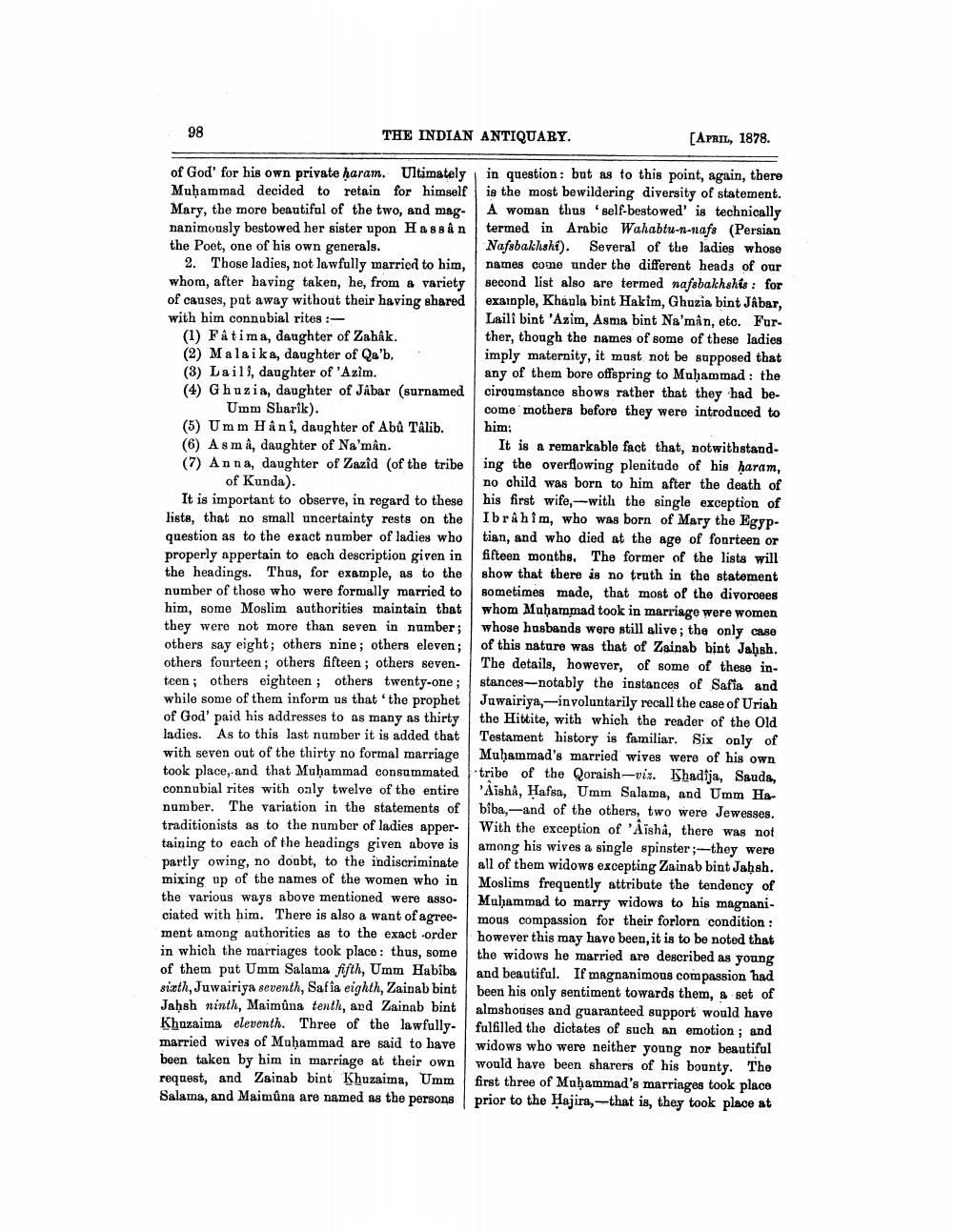________________
98
THE INDIAN ANTIQUARY.
[APRIL, 1878.
of God' for his own private haram. Ultimately Muhammad decided to retain for himself Mary, the more beautiful of the two, and magnanimously bestowed her sister upon Hassan the Poet, one of his own generals.
2. Those ladies, not lawfully married to him, whom, after having taken, he, from a variety of causes, put away without their having shared with him connubial rites :
(1) Fátima, daughter of Zabâk. (2) Malaika, daughter of Qa'b. (3) Laili, daughter of 'Azim. (4) Ghuzia, daughter of Jabar (surnamed
Umm Sharik). (5) Umm Hâni, daughter of Abu Talib. (6) Asmâ, daughter of Na’mân. (7) Anna, daughter of Zazid (of the tribe
of Kunda). It is important to observe, in regard to these lists, that no small uncertainty rests on the question as to the exact number of ladies who properly appertain to each description given in the headings. Thus, for example, as to the number of those who were formally married to him, some Moslim authorities maintain that they were not more than seven in number; others say eight; others nine; others eleven; others fourteen; others fifteen; others seventeen; others eighteen ; others twenty-one; while some of them inform us that the prophet of God' paid his addresses to as many as thirty ladies. As to this last number it is added that with seven out of the thirty no formal marriage took place, and that Muhammad consummated connubial rites with only twelve of the entire number. The variation in the statements of traditionists as to the number of ladies appertaining to each of the headings given above is partly owing, no doubt, to the indiscriminate mixing op of the names of the women who in the various ways above mentioned were associated with him. There is also a want of agreement among authorities as to the exact order in which the marriages took place : thus, some of them put Umm Salama fifth, Umm Habiba sixth, Juwairiya seventh, Safia eighth, Zainab bint Jahsh ninth, Maimûna tenth, and Zainab bint Khuzaima eleventh. Three of the lawfullymarried wives of Muhammad are said to have been taken by him in marriage at their own request, and Zainab bint Khuzaima, Umm Salama, and Maimûna are named as the persons
in question : but as to this point, again, there is the most bewildering diversity of statement. A woman thus 'self-bestowed' is technically termed in Arabic Wahabtu-n-nafs (Persian Nafsbakhsht). Several of the ladies whose names come under the different heads of our second list also are termed nafsbakhshis : for example, Khaola bint Hakim, Ghuzia bint Jabar, Laili bint 'Azim, Asma bint Na'mîn, etc. Further, though the names of some of these ladies imply maternity, it must not be supposed that any of them bore offspring to Muhammad : the circumstance shows rather that they had become mothers before they were introduced to him:
It is a remarkable fact that, notwithstanding the overflowing plenitude of his haram, no child was born to him after the death of his first wife,-with the single exception of Ibrahim, who was born of Mary the Egyptian, and who died at the age of fourteen or fifteen months. The former of the lists will show that there is no truth in the statement sometimes made, that most of the divorcees whom Muhammad took in marriage were women whose husbands were still alive; the only case of this nature was that of Zainab bint Jahsh. The details, however, of some of these instances-notably the instances of Safia and Juwairiya, --involuntarily recall the case of Uriah the Hittite, with which the reader of the Old Testament history is familiar. Six only of Muhammad's married wives were of his own tribe of the Qoraish-vis. Khadija, Sauda, Aisha, Hafsa, Umm Salama, and Umm Habiba, -and of the others, two were Jewesses. With the exception of 'Aishâ, there was not among his wives a single spinster ;-they were all of them widows excepting Zainab bint Jahsh. Moslims frequently attribute the tendency of Muhammad to marry widows to his magnanimous compassion for their forlorn condition : however this may have been, it is to be noted that the widows he married are described as young and beautiful. If magnanimous compassion had been his only sentiment towards them, a set of almshouses and guaranteed support would have fulfilled the dictates of such an emotion; and widows who were neither young nor beautiful would have been sharers of his bounty. The first three of Muhammad's marriages took place prior to the Hajira,--that is, they took place at




